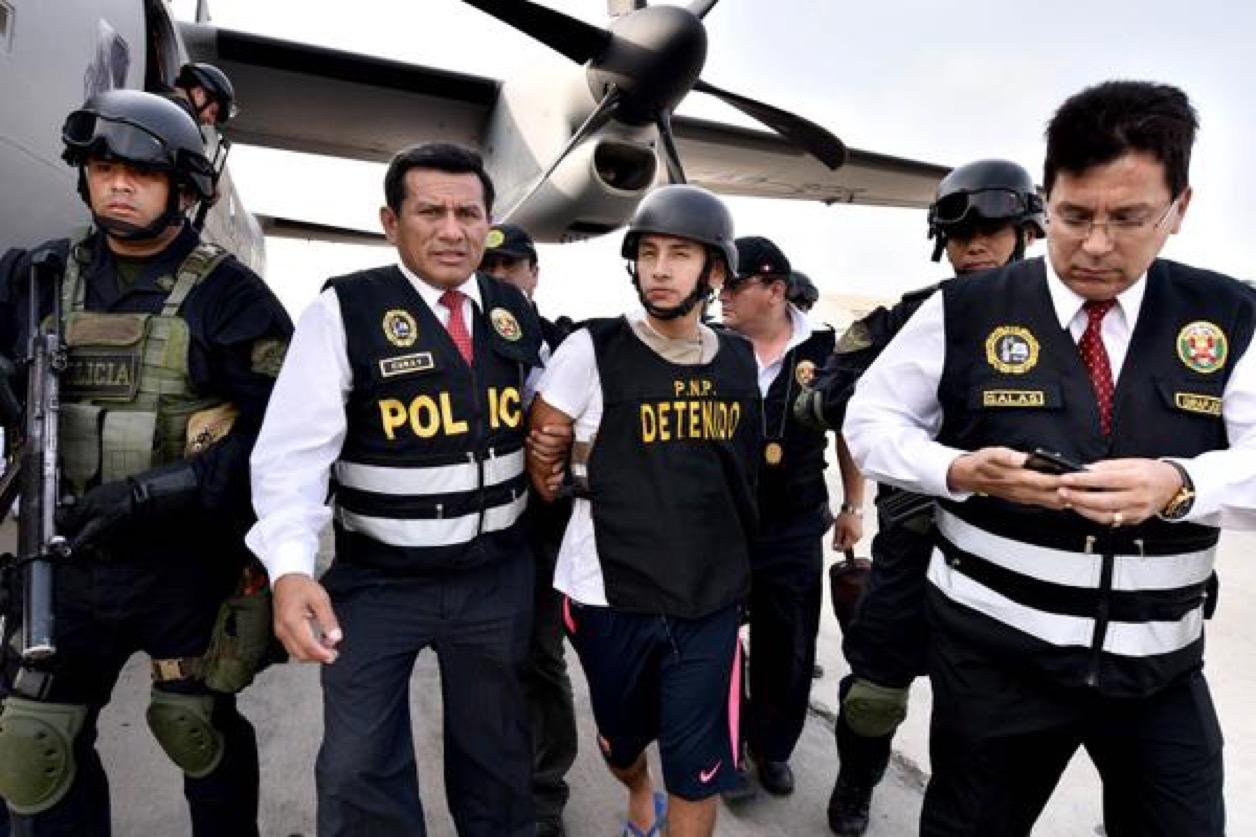Meet Peru’s ‘Tony Montana,’ the man accused of fueling Europe’s messy coke habit
Police caught Gerald Oropeza on Saturday in Ecuador and quickly extradited him to Peru.
LIMA, Peru — For Peruvians, Gerald Oropeza is a real-life Scarface.
He's even known here by the nickname "Tony Montana" — after Al Pacino’s powerful drug lord role.
His recent downfall, however, was nothing like the movie.
After nearly five months on the run, the alleged drug kingpin was arrested quietly Saturday in a pharmacy in the touristy beach town of Salinas, Ecuador.
The flip-flops, soccer shorts and crumpled Armani Exchange T-shirt belied the 30-something’s ferocious reputation as Peru’s most wanted suspected drug trafficker.
In the country that alternates with Colombia for the title of the world’s biggest cocaine producer, that is no small feat.
According to prosecutors in Lima, Oropeza was the mastermind behind an operation that worked hand in hand with the Italian mafia and Mexican cartels to send cocaine worth hundreds of millions of dollars to Europe.
Now after Oropeza’s swift extradition to Peru, here’s the question being asked: Could he be about to dish the dirt on his alleged close ties to former government officials?
That hits on a key issue in a nation riddled with corruption, a factor that’s allowed Peru’s drug trade to mushroom in recent decades, especially as Europe’s rising narcotics demand takes up the slack from a stagnant United State market.
More from GlobalPost: Is Peru’s new anti-drug policy too tough even for Washington?
Already, Peruvian media have reported a series of telling details about Oropeza’s background.
The fact that he was a member of ex-President Alan Garcia’s Alianza Popular Revolucionaria Americana party (APRA) — until national headlines about his alleged crimes got him kicked out — may be the least of it.
Perhaps the most staggering is that Oropeza and his family launched three companies that won dozens of state contracts, including 149 million Peruvian soles (US$46 million) of business to provide cleaning services to the offices of Peru’s national prosecutors.
That’s despite the family’s apparent lack of background in that line of work or legitimate start-up capital. The peak of their success came during Garcia’s 2006-2011 presidency.
More from GlobalPost: Mexican drug cartels are expanding their reach in Peru
Meanwhile, Oropeza has also had numerous business dealings with a lawyer who headed Garcia’s committee of presidential pardons.
The lawyer, Miguel Facundo Chinguel, is now on trial for allegedly accepting bribes from thousands of convicted drugs traffickers, including cartel bosses, in return for freeing them, in what's known as the “narco-pardons” scandal.
The scandal is just the latest to hit the controversial ex-president, a staunch US ally who signed a trade pact with Washington. Alleged narco-pardons could seriously hurt Garcia’s plans to run for a third presidential term next year.
But it gets worse. Oropeza was living in a luxurious 32,000 square foot mansion that belonged to the state.
More from GlobalPost: How Peru could become America's next drug war debacle
One congresswoman, Rosa Mavila, who heads a commission looking at the role of the drug trade in politics, wants the relationship between Oropeza and the APRA party put under the spotlight. “What was the extent of the nature of these links?” she has demanded. “That’s what’s got to be cleared up.”
Samuel Rotta, of Proetica, the Peruvian branch of anti-corruption group Transparency International, agrees. “What has already come out in the press is a lot. The police and prosecutors need to investigate this fully,” he told GlobalPost.
But APRA vehemently denies any corrupt links to Oropeza. Jorge del Castillo, the party’s general secretary and a former prime minister under Garcia, is leading the counterattack.
On Sunday, Castillo accused current President Ollanta Humala’s administration of “putting on a show” with Oropeza’s arrest to distract from its own problems, including serious allegations of corruption against first lady Nadine Heredia.
Oropeza’s dramatic fall from grace began in April with a grenade and machine-gun attack on his brand new white Porsche SUV as he drove away from Lima airport after returning from a business trip in Cancun, Mexico.
The victims fled the scene of the attack even though two of them were injured. Oropeza was unhurt. As police began to investigate the incident, apparently the result of a turf war between rival criminal gangs, more and more details emerged about Oropeza’s flashy lifestyle, including his fleet of cars.
The highlight was a new Ferrari he had specially shipped to Peru. As the investigation advanced, at least one of Oropeza’s close friends was found gunned down, as was one of the suspected attackers of the Porsche.
There appeared to be an all-out bloodletting between Oropeza’s gang and his rivals for control of the smuggling routes out of Callao, Peru’s principal port, and onwards to Europe.
After tapes of phone calls between Oropeza and mafia bosses in Italy were made public, the Peruvian went into hiding.
Ecuador's Interior Ministry tweets: National Police capture most wanted narco trafficker of Peru in Santa Elena (province of Ecuador).
It was after another phone call of his was intercepted that Peruvian cops partnering with Ecuadorean officers (above) tracked him down in Salinas on Saturday.
In his first interrogation since arriving in Peru, Oropeza insisted he was a legitimately successful businessman who was the target of vicious criminals.
“I have no relation to the mafia either. There are people who want to do me harm and I believe everything is connected to their extortion of me,” he said, according to La Republica newspaper.
If convicted, he faces up to 25 years in jail on charges including money-laundering and drug-running.
